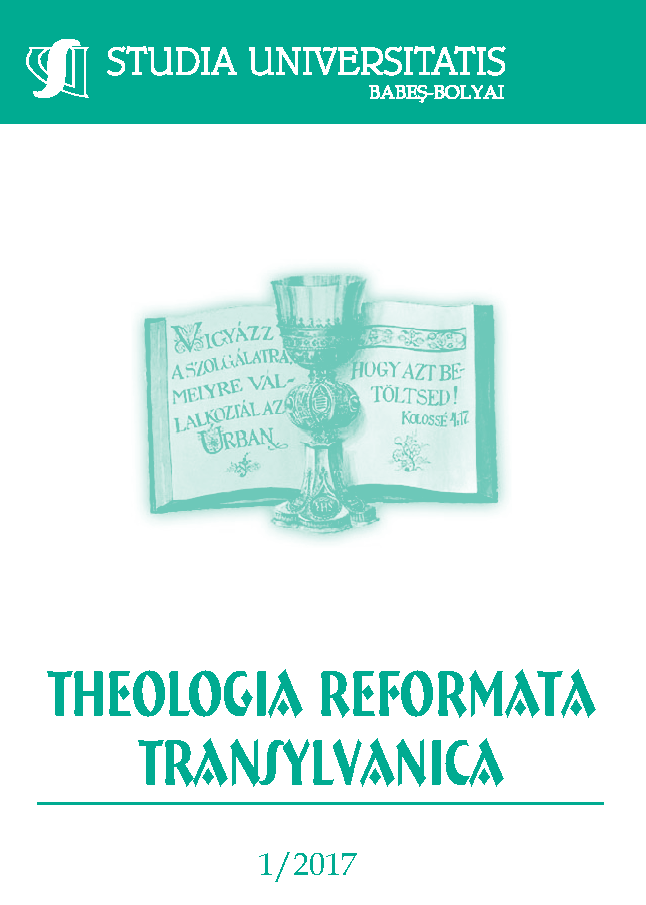Amikor (kollektív) bűn volt magyarnak lenni a Felvidéken. A kassai kormányprogram és a Beneš-dekrétumok ismertetése és hatása a Szlovákiai Református Keresztyén Egyház életére az 1945–48 közötti években
DOI:
https://doi.org/10.24193/subbtref.62.1.12Keywords:
reformed church, Beneš decrees, deportations, population exchange, Czechoslo-vakia, nation-state.Abstract
When it Was a Sin to Be Hungarian in Slovakia.
After the second world war, the plan was to create a nation-state from the renewed Czechoslovakia. The head of the state, Edvard Beneš’s intention was, to make the Germans and Hungarians, living in the country, disappear. He blamed these two nations, and the German and Hungarian minorities living in Czechoslovakia for the collapse of the country in 1938. The creation of a nation-state was supported by the Great Powers. In 1945, the Red Army liberated the former territories of Czech-oslovakia and in the absence of a central government, Edward Beneš started to rule by issuing presidential decrees. He issued 143 decrees, amongst them those pro-claiming the collective war crime of Germans and Hungarians, loss of their citizen-ship, confiscation of their properties, and it sent them to forced labour. This started their expulsion from their homeland. Hungarians were deported to Czech territory, then expelled to Hungary, finally forcefully resettled to Hungary in exchange for Slovaks living in Hungary. The plan was to "shift" 400.000 Hungarians to Hungary. In the end, 90.000 people were deported, out of them 50.000 of reformed religion. This paper deals with the effects of the deportations, resettlements from the re-formed church’s point of view.
References
BENCSIK Péter (2016), Csehszlovákia története dokumentumokban, Budapest, Napvilág Kiadó.
JANICS Kálmán (1992), A hontalanság évei, Pozsony, Madách Könyvkiadó.
KÖVESDI János (szerk.) (1996), Edvard Beneš elnöki dekrétumai avagy a magyarok és a németek jogfosztása, Pozsony, Pannónia Könyvkiadó.
LÉVAI Attila (2013), Rövid adalékok egy püspöki életúthoz. In: Lévai Attila (szerk.): Egyház és történelem. Tanulmányok az egyház életéről és történelméről. Szentendre, Tillinger Péter Mű-helye.
LÉVAI Attila – SOMOGYI Alfréd (2015), A Szlovákiai Református Keresztyén Egyház története 1918-1938. – I. rész. Egyetemi jegyzet, Komárom, Selye János Egyetem Református Teológiai Kara.
POPÉLY Árpád (2006), A (cseh)szlovákiai magyarság történeti kronológiája 1944-1992. Somorja, Fórum Kisebbségkutató Intézet.
POPÉLY Árpád (2017), Lakosságcsere és reszlovakizáció. Internetes megtekintés 2017. 03. 10-én, Elérhetőség: http://www.demografia.hu/kiadvanyokonline/index.php/demografia/article/ viewFi-le/710/383
POPÉLY Árpád (2010), A lakosságcsere területi szempontjai és etnikai következményei. In: Szeder-jesi Cecília (szerk.): „Vonatok északnak és délnek”. A második világháborút követő szlovák–magyar lakosságcsere története és következményei. Salgótarján.
VADKERTY Katalin (2007), A kitelepítéstől a reszlovakizációig 1945-1948, Pozsony, Kalligram Könyv- és Lapkiadó Vállalat.
VADKERTY Katalin (2002), Maďarská otázka v Československu 1945-1948. Trilógia o dejinách maďarskej menšiny, Bratislava, Kalligram.
Levéltári anyag:
Apácaszakállasi Református Egyházközség anyakönyvei: az 1891. évtől vezetett halotti anyakönyv és az 1891. évtől vezetett szülöttek és megkereszteltek anyakönyve.
A Magyarországi Református Egyház Zsinati Levéltára 2f/170 és 2f/169 karton.
Downloads
Published
How to Cite
Issue
Section
License
Copyright (c) 2017 Studia Universitatis Babeș-Bolyai Theologia Reformata Transylvanica

This work is licensed under a Creative Commons Attribution-NonCommercial-NoDerivatives 4.0 International License.






